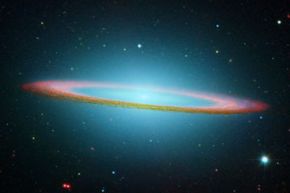The Mathematical Universe
The history of mathematics is a history of humanity seeking to understand the universe. Therefore, many consider the holy grail of mathematics to be the same as that of physics: a theory of everything, a unified theory that explains all physical reality.
Math generally plays a vital role in any theory of everything, but contemporary cosmologist Max Tegmark even goes so far as to theorize that the universe itself is made of math. In his mathematical universe hypothesis, he proposes that math is indeed a human discovery and that the universe is essentially one gigantic mathematical object. In other words, mathematics no more describes the universe than atoms describe the objects they compose; rather math is the universe. Tegmark even goes so far as to predict that a mathematical proof for a theory of everything could eventually fit on a T-shirt.
Advertisement
More than 60 years earlier, however, Austrian mathematician Kurt Gödel put forth a theory that argues quite the opposite. Gödel's first incompleteness theorem concerns axioms, logical mathematical statements that we assume to be true but can't be proven with a mathematical proof. A simple example of this would be the axiom of equality (X = X). We assume this to be a true statement, but we can't actually back it up with a mathematical proof. Gödel's theorem states that any adequate axiomatizable theory is incomplete or inconsistent.
The implication, according to theoretical physicist and mathematician Freeman Dyson, is that mathematics is inexhaustible. No matter how many problems we solve, we'll inevitably encounter more unsolvable problems within the existing rules [source: Feferman]. This would also seem to rule out the potential for a theory of everything, but it still doesn't relegate the world of numbers to either human invention or human discovery.
Regardless, mathematics could stand as humanity's greatest invention. It composes a vital part of our neural architecture and continues to empower us beyond the mental limits we were born with, even as we struggle to fathom its limits.
Explore the links below to learn even more about mathematics.
Related Articles
- How are Fibonacci numbers expressed in nature?
- How Tessellations Work
- How Fractals Work
- Quiz: Tessellate This!
- The Ultimate Fractals Quiz
- How Bits and Bytes Work
- How Isaac Newton Worked
- What does Einstein's formula for relativity really mean?
More Great Links
Sources
- Cole, Marilyn. Personal interview. May 10, 2011.
- Courant, Richard and Herbert Robbins. "What is Mathematics?" Oxford University Press. July 18, 1996.
- Dehaene, Stanislas. "What Are Numbers, Really? A Cerebral Basis For Number Sense." Oct. 27, 1997. (April 19, 2011)http://www.edge.org/3rd_culture/dehaene/index.html
- Feferman, Solomon. "The nature and significance of Gödel's incompleteness theorems." Institute for Advanced Study, Princeton. Nov. 17, 2006. (April 25, 2011)http://math.stanford.edu/~feferman/papers/Godel-IAS.pdf
- Feynman, Richard P. "The Pleasure of Finding Things Out." Perseus Publishing. 1999.
- Hill, Josh. "Is Mathematics Discovered or Invented?" Daily Galaxy. April 28, 2008. (April 19, 2011)http://www.dailygalaxy.com/my_weblog/2008/04/is-mathematics.html
- Joyce, David E. "History of Trigonometry Outline." Clark University. (April 19, 2011)http://aleph0.clarku.edu/~djoyce/ma105/trighist.html
- Miller, Lulu. "Innate Numbers?" RadioLab. Nov. 30, 2009. (April 19, 2011)http://www.radiolab.org/2009/nov/30/innate-numbers/
- Mullich, Joe. "Rising to the Challenge." The Wall Street Journal. 2009. (April 21, 2011)http://online.wsj.com/ad/article/mathscience-rising
- Myers, Dale. "Godel's Incompleteness Theorem." Pacific Union College. (April 25, 2011)http://www.math.hawaii.edu/~dale/godel/godel.html#FirstIncompleteness
- Peterson, Mark A. "The Geometry of Paradise." The Mathematical Intelligencer. 2008.
- "Philosophy of Mathematics." Stanford Encyclopedia of Mathematics." Sept. 25, 2007.http://plato.stanford.edu/entries/philosophy-mathematics/
- Richardson, William H. "A Time-line for the History of Mathematics." Wichita State University. (April 19, 2011)http://www.math.wichita.edu/~richardson/
- Rosen, Gideon. "What are numbers?" Philosophy Talk. March 14, 2006. (April 19, 2011)http://www.philosophytalk.org/pastShows/Number.html
- Ross, Marty. "The Decline and Continued Fall of Australian Mathematics." Maths Masters. (May 10, 2011)http://www.qedcat.com/marty_ross_fall_of_mathematics.pdf
- Slavin, Steve. "All the Math You'll Ever Need." John Wiley & Sons, Inc. 1989.
- Tegmark, Mark. "Shut up and calculate." New Scientist. Sept.15, 2007. (April 25, 2011)http://arxiv.org/PS_cache/arxiv/pdf/0709/0709.4024v1.pdf
- U.S. Department of Education. "Math Teachers: The Nation Builders of the 21st Century: Remarks to the National Council of Teachers of Mathematics." Arne Duncan. April 15, 2011. (April 26, 2011)http://www.ed.gov/news/speeches/math-teachers-nation-builders-21st-century
- Way, Rupert. Personal interview. April 27, 2011.
